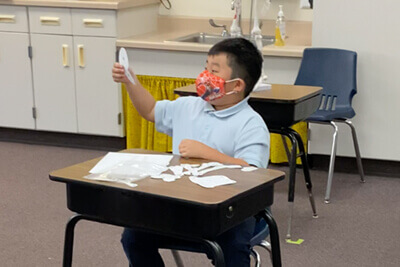October 1, 2020
 by Dr. Bill Hudson, Head of School
by Dr. Bill Hudson, Head of School
I recently stepped into a third-grade classroom and taught a lesson on fractured fairy tales. Students were learning about the essential elements of good writing—the setting of the story, the plot, and point of view. By placing the traditional fairy tale of the “Three Little Pigs” in the context of the culture and geography of the Southwest, students critically analyzed the text and discussed the writer’s choices. By asking questions such as the significance of a house made of tumbleweed instead of straw, saguaro instead of sticks, or an adobe house instead of a brick house, they also were learning the important skill of critical thinking.
Over the last several weeks, I’ve written on two particular weighty issues: antiracism and civil discourse. What is common to both topics is critical thinking. The work of dismantling racism depends on the ability to think critically about what laws, cultural norms, and policies perpetuate racism. Likewise, critical thinking is fundamental to civil discourse by insisting that ideas, opinions, and beliefs are both intellectually grounded and evidence-based.
Fortunately, critical thinking is in the DNA of MPA. It is so integral to who we are as a school that is holds a primary position in our mission statement. Before “Dream Big. Do Right.” was our school motto, it was “We don’t teach students what to think, we teach them how to think.” We hear from many alumni that one of the most important lessons they learned during their time at MPA was the ability to think critically.
At MPA, we firmly hold that content knowledge is a prerequisite for critical thinking. Contrary to a current educational trend, critical thinking is not necessarily a skill that can be taught independently from content knowledge. For example, understanding the civil rights movement of the 1960’s is crucial to making sense of the current manifestation of racism. Rigor with meaning at MPA describes the importance we place on rich subject matter knowledge as the basis for critical thinking.
Whereas some may think humility is a “soft skill,” we at MPA see it as a necessary component of critical thinking. Humility is a beginning point to acknowledge and actively seek to examine and re-examine our thinking, our beliefs, and opinions. Humility creates an opening for deep listening—something we certainly need more of these days. Rather than assuming our viewpoint is “right”, humility leads us to listen to other perspectives, be open to the possibility that we do not have all the answers, and learn from someone who thinks very differently.
We’re living in a very complex age of information where we’re bombarded with media images and information accessible through social media and other online platforms. The emphasis we place on media literacy is yet another way in which MPA fosters critical thinking. We believe it is essential that students are taught how to be able to use information effectively and evaluate it for bias and credibility. As librarian Nancy Lage explains, “Media literacy requires that students understand how to gather credible information, communicate objective ideas, solve problems and apply their skills to real world events and situations.”
An important aspect of fostering critical thinking is to provide opportunities to practice them. In the Upper School, one of our most popular electives is Persuasive Communication. In the course, students learn to effectively research a topic, read high-level material to gather evidence and opinions, and develop arguments for and against a given position. They practice active listening skills in order to thoughtfully consider and interpret the position of others. The strength of our award-winning Debate Team (with 54 students this year) allows students to apply the life-long skills learned in class.
At MPA, we know that the best education occurs when deep content knowledge and critical thinking serve as the foundation for growing flexible and essential skills in collaboration, problem solving, perseverance, and creativity. We are living in a time like no other when the convergence of economic, public health, and environmental challenges make it abundantly clear that fostering independent thinkers is absolutely essential.